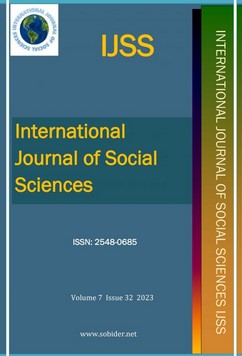Eğitimde Ölçme ve Değerlendirme Süreçleri Bağlamında Öğrencilerin Kendilerini Değerlendirmesi
Evaluation of Students Themselves in the Context of Measurement and Evaluation Processes in Education
Author(s): Hakan BaharSubject(s): Psychology of Self, Distance learning / e-learning, Pedagogy
Published by: SD Yayınevi
Keywords: Education; Measurement and Evaluation; Student; Self-Evaluation;
Summary/Abstract: With the developments in information and communication technologies, assessment environments and tools in learning are changing differently from traditional understanding. Web environments, which have started to be used extensively together with the Internet, offer a multiple and interactive environment for learning applications and evaluations. The web is a graphical service located on the Internet. Of the prepared contents (graphics, text, sound, animation, image, etc.) an application software running on an internet-connected computer can be defined as a web server in order to be transmitted to all users around the world and for users to access these files. Web server programs may differ depending on the operating system on which they are installed. Self-assessment means that the learner creates a critical approach to their own learning processes, keeps records or makes suggestions about evaluations. It has been observed that the critical approach positively improves the learning process. The fact that progress is recorded ensures that an appropriate direction is given to learning. At the same time, the person's self-assessment helps the teacher to be more fair and realistic about the learning process when making the final assessment. At first, the results of self-assessment may be surprising for some students, because self-assessment can get better with practice and guidance. Research has shown that evaluation correlations can become more significant thanks to adequate guidance. With the advancement of technology, educators are more willing to use electronic learning processes and applications. Electronic presentation, communication and resources affect learning in a positive way. Links between web pages increase learning by Deconstructing and creating by themselves. Cavanaugh argues that the use of self-assessment in education is an important technique and emphasizes that individual assessment reflects one of the pedagogical markers of web-based learning, which refers to the changing role from the audience to the actor. According to this, since students are lonely, self-assessment supports more effective participation rather than waiting for help directly from the teacher. Students need to be comfortable when evaluating themselves, and besides, they need to be more honest with themselves than with the teacher. Schunk emphasized that it would be appropriate to apply the self-assessment technique in formal, preschool and kindergarten education and stated that self-assessment would help students gain control.
Journal: Uluslararası Sosyal Bilimler Dergisi
- Issue Year: 7/2023
- Issue No: 31
- Page Range: 673-685
- Page Count: 13
- Language: Turkish

